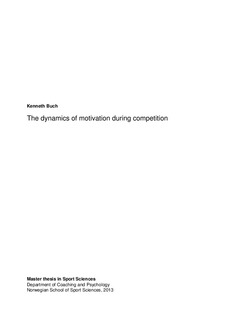| dc.description.abstract | Previous studies on achievement motivation have not yet come to any clear consensus on how motivation can affect an athlete while performing. Based on achievement goal theory, this study aimed to show how changes in motivation can affect sports performance in a maladaptive way. In the study three experienced top-level Norwegian orienteers wore head-mounted cameras during a real high-pressure competition. After the competition the participants' cognitions were collected by a specially developed method which also identified the situations where the changes in motivation happened. Before the competition, goal-orientation scores were measured with Perception of Success Questionnaire (Roberts, Treasure, & Balague, 1998), also the general self-beliefs was defined. These new findings provide a much deeper insight into the phenomena of changes in motivation during competition. It was suggested that changes in motivation from task-involvement to ego-involvement occur because the context of the performance in some situations attracts an ego-involvement and creates a fixed-point attractor. Change in motivation also showed negative, positive and no consequences for performance, which both lead to support and criticism for the achievement goal theory. Furthermore no clear link was found between goal-orientation scores, general self-beliefs and goal-involvement. During the period of ego-involvement the athletes gave rational and irrational self-evaluations which were mainly based on subjective factors. These findings indicate that athletes have less control of their performance when they are in a state of goal-involvement. To deal with this adaptively a recommendation that athletes need to build ability to deal with periods of ego-involvement is advisable. | no_NO |
